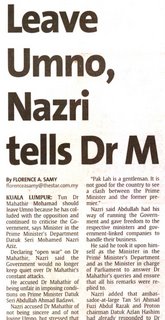 Mahathir was absolutely right when he said the media was used by the regime to blockout his views. (of course he did the same when he was in power and he readily admitted to it too).
Mahathir was absolutely right when he said the media was used by the regime to blockout his views. (of course he did the same when he was in power and he readily admitted to it too).Today, both The Star and NST were prepared to voiced the view of the maverick Nazri who pours scorns and tirades on his ex-master whom he kissed his hands hundreds of times over the past decade.
The Malay Proverb said: Kacang Sudah Lupa Kulit".
This is absolute UMNO-style politics. MCA don't do this. When Ling Liong Sik retired to pass down the power baton to his successor, OKT, the new president continued with his dream and aspiration and only made gradual-invisible structural changes while consciously avoid any acts or omissions which could tarnish the image of their predecessors and at the same time, correct those weaknesses and "wrongs" without fanfare and without allowing the young turks and family connection to opportunitized the circumstances, making the party a ground to launch a fast track political rocketting.
 However, UMNO is doing it conspicuously and used all available media and communication channels to blacken the "eyes" and "heart" of their ex-master. In fact, the most ironical theory forwarded by UMNO aka Nazri is that:
However, UMNO is doing it conspicuously and used all available media and communication channels to blacken the "eyes" and "heart" of their ex-master. In fact, the most ironical theory forwarded by UMNO aka Nazri is that:"...by constantly sniping at the administration, Dr Mahathir was giving ammunition to an Opposition which was bankrupt of ideas. Cabinet ministers had kept quiet hoping things would cool down."
Shahrir Abdul Samad said "Nazri might have been “a bit extreme” and that Mahathir's criticisms could be capitalised on by the opposition even though the Government would be able to defend itself."
Acting Backbenchers' Club chairman Datuk Raja Ahmad Zainuddin Raja Omar said "what Nazri said was his own opinion, but what is important is unity in the party. If we are weak, the opposition will take advantage of us.”
Lim Kit Siang said "Nazri should not have made 'superficial statements' by asking Dr Mahathir to resign from Umno. The question is whether Dr Mahathir's criticism has validity or not."
The Malaysian public is made aware of various key points:
Firstly, the main concern is about the ruling party's ability to retain power and not to allow the opposition to take any advantage over the weak system or dysfunction system. Every UMNO leader is not concern of what Mahathir said is true or false, or and there is no call to analyse the system for weaknesses. To them, it is about retaining power in absoluteness and at all price to retain the prize. It matters not that the system is corrupt or dysfunctioning. It matters that what Mahathir said will expose the cans of worms within the kleptocratic system.
Equally, it is noted in Mahathir's latest round of criticisms against the Government during a dialogue with local news portal Malaysia Today on Saturday that he (Mahathir) admitted that before he stepped down, he agreed to charge at least one person with corruption but he said he don't know why the prosecution was stopped after he stepped down. It is glaring that the determinants of charging someone for corruption was in the entire absolute discretion of the one man - Prime Minister - based on his wish; not on facts and evidence of wrongs.
This statement by Mahathir had directly posed the question of the validity and independence of the jurisprudence and rule of law of Malaysian legal system. In the view of Cicero (106-43 BC)"an unjust law is not law." In De Legibus, Cicero further argued that "...nor will it be one law at home and a different one at Athens, nor otherwise tomorrow than it is today."
St Thomas Aquinas (1224-74) states that a human law would be unjust where it furthers the interests of the lawgivers only and that it exceeds the power of the lawgiver which imposes burdens unequally on the governed. Under the circumstances, Aquinas said, disobedience to an unjust law becomes a duty. A law which substantially deviates from the principles of natural law is not only a bad law, but can be regarded as invalid as well, since it does not truly reflect the model of what law ought to be.
It seems we could now establish an antithesis of the application of jurisprudence had had given in to collaboration, cognitivism and contratarianism.
No comments:
Post a Comment